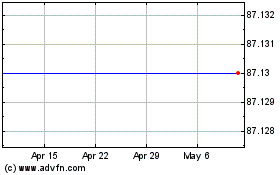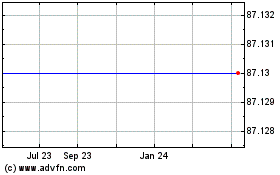Will S&P 500 Companies Continue to Deliver Strong Results?
30 October 2023 - 8:55PM
Finscreener.org
In the last two weeks, 49% of
companies in the
S&P 500 index have
announced their Q3 earnings. Of these companies, 78% have posted
earnings per share (EPS) surpassing estimates. The percentage is a
slight improvement from the 5-year and 10-year averages, which
stand at 77% and 74%, respectively. Overall, the reported earnings
are 7.7% higher than projected. While this is below the 5-year norm
of 8.5%, itU+02019s notably better than the 10-year average of
6.6%.
Breaking it down by sectors,
eight out of eleven are showcasing year-over-year growth. The
frontrunners here are Communication Services, Consumer
Discretionary, and Financials. Conversely, Energy, Materials, and
Health Care sectors are witnessing a decline in their
year-over-year earnings.
Regarding revenues, 62% of the
companies in the S&P 500 index have reported revenues
exceeding estimates. This is slightly underwhelming compared to the
5-year average of 68% and the 10-year average of 64%.
Overall, companies are reporting
revenues that surpass estimates by a mere 0.8%. The figure falls
short of the 5-year average of 2.0% and the 10-year average of
1.3%. ItU+02019s worth noting that these averages consider the
results from all 500 companies, not just those whoU+02019ve
reported at this juncture.
The Israel-Hamas war is hurting these
companies
Several renowned global companies
are starting to feel the effects of the conflict between Israel and
Hamas on their operations. United Airlines
(NASDAQ:
UAL) indicated that the duration of flight
suspensions to Tel Aviv might influence their fourth-quarter
results, with their updated earnings per share predictions falling
below market expectations. The conflict is a significant concern
for leaders in the travel sector. Boeing
(NYSE:
BA), the aircraft
manufacturer, disclosed in a regulatory report that the situation
could impact some suppliers and airlines.
Royal Caribbean (NYSE:
RCL) had intended
for approximately 1.5% of its fourth-quarter capacity to dock in
Israel. Jason Liberty, the CEO, mentioned in a recent conference
call that some of the revised cruises, initially set to dock there,
have their main ports in Haifa, a northern city in
Israel.
Align Technology (NASDAQ:
ALGN) anticipates facing
challenges due to the uncertainty surrounding the conflict,
potentially affecting its supply chain. John Morici, the CFO,
mentioned that the fourth-quarter operating margin, adjusted for
standard accounting practices, is likely to decline from the
previous quarter. This decrease is attributed to the company making severance payments
in light of necessary staff adjustments related to the current
circumstances.
Will the UAW labor strike come to an end?
The United Auto Workers union
and Stellantis (NYSE:
STLA) have reached a
provisional agreement, aiming to conclude approximately six weeks
of specific U.S. labor strikes, as stated by the union this
Saturday.
The accord, pending approval from
union local leaders and members, mirrors a 4½-year agreement that
the union and Ford Motor (NYSE:
F) established earlier on
Wednesday.
Hopes were high that the UAW
would strike a deal with General Motors
(NYSE:
GM), but these were
dampened when the union broadened its strike to another GM assembly
facility in Spring Hill, Tennessee, on Saturday. UAW President
Shawn Fain expressed dissatisfaction with GMU+02019s reluctance to
finalize a fair agreement.
This tentative deal with
Stellantis follows a similar understanding the union came to with
Ford earlier in the week, which still awaits endorsement and
ratification by the union members and leaders.
The prospective agreement with
Stellantis is anticipated to conclude the unionU+02019s targeted
labor strikes initiated when negotiations fell through for 146,000
UAW members ahead of the September 14 deadline. Subsequently, the
union recalled over 16,000 Ford workers on strike after arriving at
a preliminary agreement with the company.
FordU+02019s arrangement proposed
salary hikes of 25% over the agreementU+02019s duration, starting
with an 11% increase. These combined raises elevate the maximum
wage beyond $40 per hour, marking a 68% jump in initial wages to
above $28 per hour. Additional highlights of the deal include
reinstating cost-of-living adjustments, trimming the eight-year
journey to peak wages down to three years, and including the option
to strike in response to plant shutdowns, among other improved
benefits.
The labor disputes have set GM,
Ford, and Stellantis back by billions in lost revenue. Ford
disclosed on Thursday that the UAW strike has led to a $1.3 billion
loss. Additionally, if the deal gets ratified, Ford expects a surge
in labor expenses by about $850 to $900 for each vehicle
manufactured. On the other hand, GM reported on Tuesday a loss of
approximately $800 million due to the strike.
Ual (NYSE:UAL)
Historical Stock Chart
From Jan 2025 to Feb 2025

Ual (NYSE:UAL)
Historical Stock Chart
From Feb 2024 to Feb 2025
